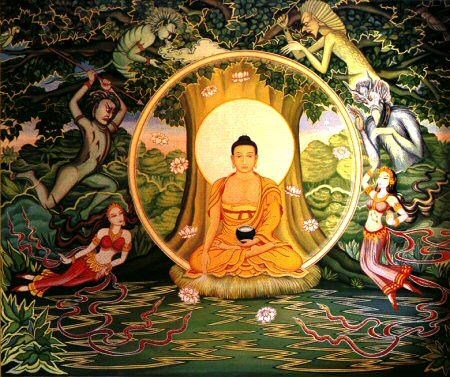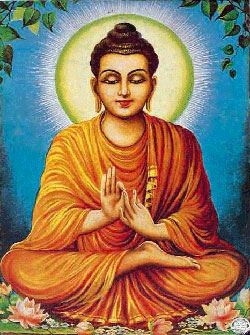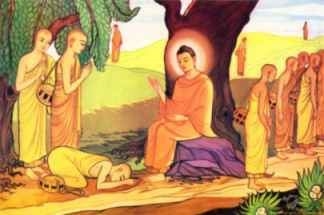 |
| (http://lolering.files.wordpress.com/2009/02/gautama-buddha.jpg) |
Did you know that an estimated 1.02 billion people worldwide live undernourished? That means that 1.02 billion people, worldwide, are suffering. We, as people, seldom dwell on the problems of others. We only look at our own and complain. Our suffering is too much homework, or getting our phones taken away. Their suffering is constantly facing life or death conditions. Siddhartha Gautama, better well-known as the Buddha, saw all the suffering that other people in the world were facing, rather than his own. He asked himself, “How can I enjoy a life of pleasure when there is so much suffering in the world?” This began the Buddha’s journey to achieve enlightenment and learn the truths about pain and suffering. The Buddha is definitely a hero because of the enormous, positive impact he left on the world. Compassionate and respectful to everyone, he strived to succeed in what he believed in, regardless of the obstacles.
Siddhartha Gautama was born in northern India at around 560 BC. He was born as the son of the local king, so he lived an early life of luxury and was given an education to prepare him to become a ruler. His life was perfect; he didn’t have to worry about anything. So why did he give up everything to become a wandering monk? It became a path he knew he had to take after encountering the “four signs.” Gautama went outside the palace grounds and saw, for the first time, sickness, old age, and death. He didn’t understand, because he had never before seen suffering. Overcome by the need to discover the truth, he left his royal life to search for the answers to human suffering.
 |
| (http://fotodoom.com/wp-content/uploads/1216827508goutam-buddha.jpg) |
He began his journey and, “spent six years performing intense ascetic practices and studying with several different teachers. He accomplished each of the goals, at one point reducing himself to a mere skeleton by living on a few dried beans and a sip of water a day, but he then realized that extreme asceticism could not bring him to spiritual enlightenment. It was this understanding that led him to advocate the middle way — that is, neither the indulging of the senses (as in his palace life) nor withdrawing from them (as in his life as an ascetic) will lead to enlightenment.” (Brown) He gave up everything, his family, his wife, his royalty, to discover the depths and truths of suffering. He wanted to learn the meaning and how to help others so they wouldn’t suffer. To have the heart to care for others that much, that you’d be willing to sacrifice what’s important to you for them, that’s a heroic characteristic.
Even while facing struggles throughout his journey to enlightenment, The Buddha lived an unbiased life treating everyone with equal respect and care. "He never became angry or impatient or spoke harshly to anyone, not even to those who opposed him. He always taught in such a way that everyone could understand. Each person thought the Buddha was speaking especially for him” (Instilling Goodness School). He spoke to anyone willing to listen, and helped those in need. He spoke to beggars, kings, slave girls, everyone. The love he expressed for people he didn’t even know is inspiring. He would help you, whoever you were, whatever you did, or whatever you wanted to be. If you listened, The Buddha would help.
 |
| (http://jyotisha.00it.com/Buddha2.jpg) |
Another thing that makes a person a hero is their ability to create a lasting, positive impact on peoples’ lives. Not only was The Buddha a kind, humble man, he was also unselfish and sincere. “Once the Buddha and Ananda (his chief disciple) visited a monastery where a monk was suffering from a contagious disease. The poor man lay in a mess with no one looking after him. The Buddha himself washed the sick monk and placed him on a new bed” (Instilling Goodness School). After the Buddha helped nurse this man, he gave a sermon to the monks. He told them that they did not have a father or mother to look after them, whoever served the sick and suffering would serve him. The Buddha wanted everyone to help one another in the midst of hard times, to be selfless and kind. Although everyone experiences suffering, the Buddha realized after his enlightenment that suffering is a part of life. Just as death, sickness, or loss is a part of life. By sharing this knowledge with everyone, others understood and followed in his footsteps, learning what he taught. His journey and acquired wisdom which he shared with others changed lives, impacting people worldwide. The Buddha’s relentless selflessness is an inspiring trait that truly makes him a hero.
From a sheltered, royal prince to a wise, inspiring monk, the Buddha is very much a hero because of all he did: his selfless denunciation of his royal life, undertaking a hard life of being a wandering monk and discovering the truth about suffering. The Buddha cared not for himself, but rather for the people around him. He spoke to everyone with equal respect, and made long, lasting impressions on peoples’ lives. A hero is one who gives and asks for nothing in return. That is exactly what The Buddha did, which makes him a true hero. If everyone could think and act more like the Buddha, then maybe there would be less suffering. We might, then, think less of ourselves and more about others that could need our help.
Page created on 5/20/2010 12:00:00 AM
Last edited 7/25/2018 11:09:23 PM
Author, No. "Following the Buddha's Footsteps." [Online] Available http://online.sfsu.edu/~rone/Buddhism/footsteps.htm.
Author, No. Encyclopedia of World Biography. 2nd ed. Vol. 3. . 2004: Gale
Darity, Ed. William A.. International Encyclopedia of the Social Sciences. 2008: Macmillan Reference
Brown, Robert L. . Encyclopedia of India. 2006.
Kelsang, Geshe. "About the Buddha." [Online] Available http://www.aboutbuddha.org/english/life-of-buddha.htm/>..
